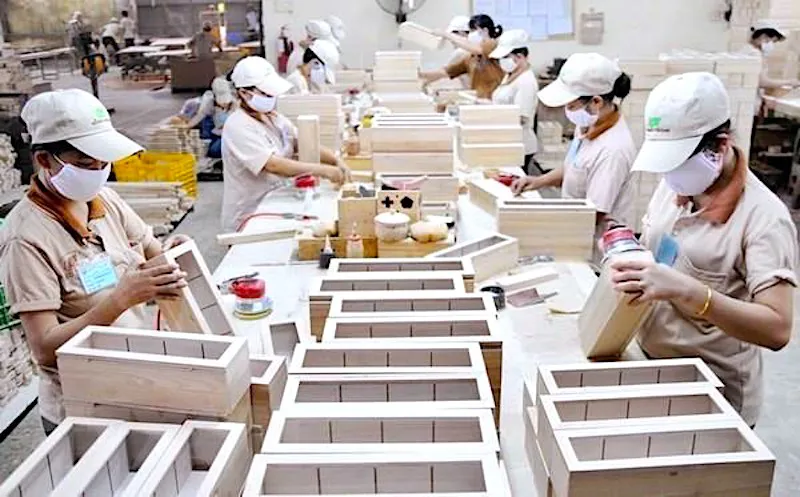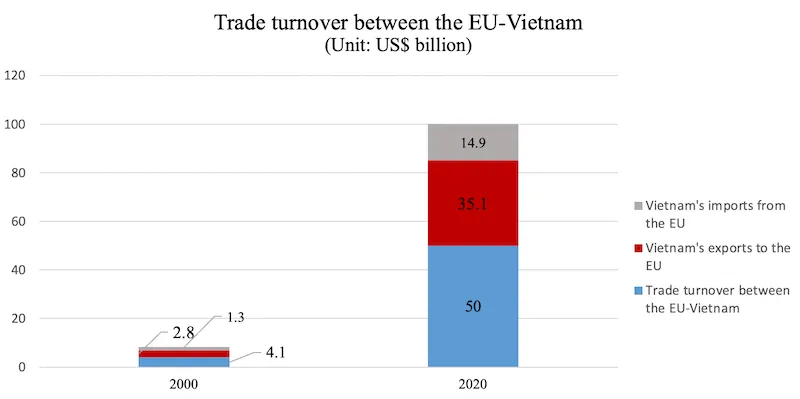Sustainable product development must be a focus
The EU is currently one of the leading export markets for many key Vietnamese products such as textiles and garments, seafood, furniture, and wood products.
Vietnamese exporters need to focus on developing sustainable products while designing their export strategies in line with the needs and trends of the EU market to meet the consumers' increasing demand for sustainability, including traceability, social responsibility, and environmental protection.
| Vietnamese wood products are among key exports to the EU. Photo: VNA |
Adam Koulaksezian, General Director of the French Chamber of Commerce and Industry in Vietnam (CCI France-Vietnam) gave his recommendations to Vietnamese exporters at the webinar “Access to European market” organized by the Investment and Trade Promotion Center of Ho Chi Minh City (ITPC) in collaboration with the CCI France-Vietnam on July 7.
The EU is one of the leading partners for Vietnamese key export items including textiles, garments, seafood, furniture, and wood products.
Speaking at the webinar, Nguyen Dac Boi Quynh, CCI France-Vietnam’s Business Development Director said, despite impacts from the Covid-19 pandemic, trade between the EU and Vietnam has performed well in the first half of this year.
Many of Vietnam’s exports to the EU grew by more than 10% over the same period of 2020, while Vietnam's imports of raw materials and accessories from the EU for domestic production have surged.
However, trade activities between the two sides are also facing many challenges, Quynh said.
“Traceability requirements and updates on consumption trends of the EU market are challenging the Vietnamese exporters. The EU market also requires them to have certificates of product quality, quarantine, and hygiene,” she analyzed.
In the context of the complicated developments of Covid-19, especially in the southern provinces and cities, many enterprises in the wood and seafood processing industries have kept their production activities as well as complying with regulations to prevent and control the disease.
Pham Thi Hong Quang, Director of Viet Source Handicraft Co., Ltd noted that EU importers and consumers attach great importance to sustainable development-related issues, including the origin of raw materials, labor safety, environment, and social welfare.
“Vietnamese exporters to the market need to have a strategy to adjust the supply chain, matching international standards and rules as well as make effective use of modern marketing and trade channels,” Quang said.
The EU is the company’s target market so that it has invested in building facilities meeting the technical and quality standards of the importers.
| Source: Vietnam's General Statistics Office. Chart: Phi Nhat |
As the Covid-19 pandemic restricted direct trading activities, the Viet Source Company has used digital platforms for promoting export activities and regularly updated themselves with new trends and consumer tastes. As a result, its export revenue from the EU market increased by 20% compared to the level before the pandemic outbreak.
Jean Gabriel Mollard, Global Communications Director of SIAL Group said after the Covid-19 pandemic, consumers in many parts of the world and especially the EU are increasingly interested in health and environmental protection, safety, nature-friendly factors as well as transparency of information printed on products.
He said product ingredients are consumers’ special interest that requires manufacturers to improve items more subtle and appealing to senses.
According to the ITPC, trade between Vietnam and the EU has achieved many positive results in recent years and is forecast to grow even more strongly thanks to the effect of the EU-Vietnam Free Trade Agreement (EVFTA).
Bilateral trade turnover has increased 12 times from US$4.1 billion (2000) to nearly $50 billion (2020). Vietnam's exports to the EU increased 13 times from $2.8 billion to $35.1 billion in 2020.












